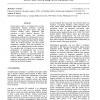Free Online Productivity Tools
i2Speak
i2Symbol
i2OCR
iTex2Img
iWeb2Print
iWeb2Shot
i2Type
iPdf2Split
iPdf2Merge
i2Bopomofo
i2Arabic
i2Style
i2Image
i2PDF
iLatex2Rtf
Sci2ools
134
click to vote
ICML
2001
IEEE
2001
IEEE
Direct Policy Search using Paired Statistical Tests
Direct policy search is a practical way to solve reinforcement learning problems involving continuous state and action spaces. The goal becomes finding policy parameters that maximize a noisy objective function. The Pegasus method converts this stochastic optimization problem into a deterministic one, by using fixed start states and fixed random number sequences for comparing policies (Ng & Jordan, 1999). We evaluate Pegasus, and other paired comparison methods, using the mountain car problem, and a difficult pursuer-evader problem. We conclude that: (i) Paired tests can improve performance of deterministic and stochastic optimization procedures. (ii) Our proposed alternatives to Pegasus can generalize better, by using a different test statistic, or changing the scenarios during learning. (iii) Adapting the number of trials used for each policy comparison yields fast and robust learning.
ICML 2001 | Machine Learning | Policy Comparison Yields | Stochastic Optimization Problem | Stochastic Optimization Procedures |
Related Content
| Added | 17 Nov 2009 |
| Updated | 17 Nov 2009 |
| Type | Conference |
| Year | 2001 |
| Where | ICML |
| Authors | Malcolm J. A. Strens, Andrew W. Moore |
Comments (0)

